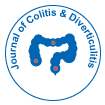Effective Management of Severe Diverticular Bleeding in Japanese Patients
Received Date: Mar 03, 2016 / Accepted Date: Mar 08, 2016 / Published Date: Mar 11, 2016
Abstract
Aim: Diverticular bleeding is a common cause of lower gastrointestinal bleeding. Aggressive treatment because of spontaneous hemostasis is typically required only in severe cases. To determine the clinical characteristics of Japanese patients with diverticular bleeding and evaluate the treatment methods used with the aim of developing an effective management approach.
Method: We conducted a retrospective cohort study of 626 Japanese patients (769 endoscopic procedures) who underwent diagnostic lower gastrointestinal endoscopy at Fujita Health University Hospital between November 2011 and April 2014.
Results: Diverticular bleeding was the most frequent cause of lower gastrointestinal bleeding, occurring in 155 patients. Concurrent illness, such as hypertension, was common and 92 patients were receiving anticoagulant or antiplatelet therapy on admission. However, no significant clinical differences were observed between patients with severe and mild diverticular bleeding. Computed tomography (CT) was useful for a treatment policy decision of the one from diverticular bleeding as well as other lower gastrointestinal bleeding. Clipping via colonoscopy could stop bleeding effectively for patients with an identified bleeding point. Barium impaction had utility in patients with persistent bleeding. Angiographic hemostasis or colectomy (intestinal resection) was only performed in uncontrolled patients in whom clipping and barium impaction was not possible.
Conclusion: No significant clinical differences were observed between patients with severe and mild diverticular bleeding. CT angiography was useful for a treatment policy decision of the one from diverticular bleeding. Endoscopic clipping and barium impaction had efficacy in severe cases of diverticular bleeding, at first.
Keywords: Angiographic hemostasis; Colectomy; CT angiography; Diverticular bleeding; Endoscopic clipping; High-dose barium impaction
Citation: Nakagawa Y, Kamano T, Ohmiya N, Tahara T, Shibata T, et al. (2016) Effective Management of Severe Diverticular Bleeding in Japanese Patients. J Colitis Diverticulitis 1: 106.
Copyright: ©2016 Nakagawa Y, et al. This is an open-access article distributed under the terms of the Creative Commons Attribution License, which permits unrestricted use, distribution, and reproduction in any medium, provided the original author and source are credited.
Share This Article
Recommended Journals
Open Access Journals
Article Usage
- Total views: 11469
- [From(publication date): 3-2016 - Dec 22, 2024]
- Breakdown by view type
- HTML page views: 10766
- PDF downloads: 703
